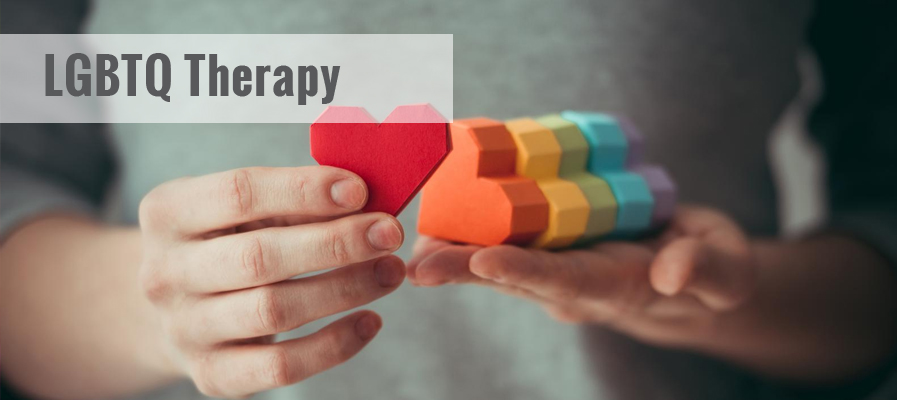Introduction LGBTQ therapy is a form of counseling designed to help individuals who identify as lesbian, gay, bisexual, transgender, queer, or questioning. It is a specialized form of therapy that aims to help individuals cope with the unique challenges and issues that they face as members of the LGBTQ community. In this blog, we will explore what LGBTQ therapy is, how it works, and the benefits it offers.
Contents
What is LGBTQ Therapy?

LGBTQ therapy, also known as queer therapy, is a specialized form of counseling that aims to help individuals who identify as lesbian, gay, bisexual, transgender, queer, or questioning. The therapy is designed to address the unique challenges and issues that members of the LGBTQ community face, such as discrimination, prejudice, social isolation, and other mental health issues related to their identity.
The goal of LGBTQ therapy is to provide a safe and supportive space for individuals to discuss their feelings, experiences, and challenges and to help them develop strategies for coping with those challenges. The therapy can include various techniques such as cognitive-behavioral therapy, family therapy, group therapy, and mindfulness-based therapy, among others.
The ultimate aim of LGBTQ therapy is to improve the mental health, relationships, self-esteem, and overall quality of life of the individual receiving the therapy.
How Does LGBTQ Therapy Works?
The following are some key components of the working of LGBTQ therapy:
- Creating a safe and affirming environment: The therapist must create a safe and accepting environment for the client to share their experiences and feelings without judgment. The therapist should also use inclusive language and demonstrate an understanding of LGBTQ issues.
- Addressing internalized homophobia or transphobia: Many LGBTQ individuals experience internalized stigma, which can lead to shame, guilt, and self-hatred. The therapist can help clients identify and challenge these negative beliefs and develop a more positive self-concept.
- Exploring identity development: LGBTQ individuals may struggle with understanding and accepting their sexual orientation or gender identity. The therapist can help clients explore their identities and provide support throughout the process of self-discovery.
- Developing coping skills: LGBTQ individuals may face unique stressors such as discrimination, rejection, and family conflict. The therapist can help clients develop coping skills to manage these stressors and build resilience.
- Providing support for coming out: The decision to come out can be challenging for LGBTQ individuals. The therapist can provide support and guidance throughout this process and help clients develop a plan for coming out to family and friends.
Overall, LGBTQ therapy provides a safe and supportive space for individuals to explore and address the challenges they face due to their sexual orientation or gender identity.
Key Techniques of LGBTQ Therapy

There are several key techniques used in LGBTQ therapy that can be helpful for individuals who identify as lesbian, gay, bisexual, transgender, or queer. These techniques are designed to address the unique challenges faced by LGBTQ individuals and to promote self-acceptance, resilience, and overall well-being. Some of the key techniques of LGBTQ therapy include:
- Affirmative approach: This approach emphasizes the importance of accepting and valuing LGBTQ identities and experiences. It involves creating a safe and accepting space for clients to explore and express their sexual orientation or gender identity.
- Cognitive-behavioral therapy (CBT): CBT is a type of therapy that helps individuals identify and challenge negative thoughts and beliefs that contribute to anxiety, depression, or other mental health concerns. It can help address internalized homophobia or transphobia.
- Family therapy: Family therapy can be helpful for LGBTQ individuals who are dealing with conflict or rejection from family members. It involves working with family members to improve communication and understanding.
- Group therapy: Group therapy provides a supportive environment where individuals can connect with others who share similar experiences and challenges. It can help reduce isolation and build a sense of community.
- Mindfulness-based interventions: Mindfulness-based interventions can help reduce stress and improve overall well-being. These interventions involve practicing mindfulness techniques such as meditation or deep breathing.
- Narrative therapy: Narrative therapy involves exploring the stories and experiences that shape an individual’s identity. It can be helpful for LGBTQ individuals who are exploring their sexual orientation or gender identity and can promote self-acceptance and self-compassion.
Benefits of LGBTQ Therapy
LGBTQ therapy can provide numerous benefits for individuals who identify as lesbian, gay, bisexual, transgender, or queer. Some of the key benefits of LGBTQ therapy include:
- Increased self-acceptance and self-esteem: LGBTQ therapy can help individuals accept and embrace their sexual orientation or gender identity, which can lead to improved self-esteem and a greater sense of self-worth.
- Improved mental health: LGBTQ individuals are at a higher risk for mental health concerns such as depression, anxiety, and substance abuse. LGBTQ therapy can provide support and strategies to manage these challenges and improve overall mental health.
- Reduced social isolation: LGBTQ individuals may feel isolated or disconnected from others due to stigma and discrimination. LGBTQ therapy can provide a supportive environment where individuals can connect with others who share similar experiences and build a sense of community.
- Improved family relationships: LGBTQ individuals may experience conflict or rejection from family members. LGBTQ therapy can provide a space for family members to improve communication and understanding, leading to improved relationships and support.
- Increased resilience: LGBTQ individuals may face unique stressors such as discrimination or rejection. LGBTQ therapy can provide strategies for coping with these stressors and building resilience.
- Improved quality of life: By addressing the unique challenges faced by LGBTQ individuals and promoting self-acceptance and well-being, LGBTQ therapy can lead to an improved overall quality of life.
Are There Any Limitations of LGBTQ Therapy?

While LGBTQ therapy can be highly beneficial for many individuals, it is important to acknowledge some of its limitations. Some potential limitations of LGBTQ therapy include:
- Limited availability: LGBTQ therapy may not be readily available or accessible in all areas, especially in areas with a limited number of trained LGBTQ therapists. This can make it difficult for individuals to access specialized care.
- Affordability: LGBTQ therapy may be more expensive than traditional therapy, which can be a barrier to access for some individuals. Insurance coverage for LGBTQ therapy may also be limited.
- Limited cultural competency: Not all therapists may have the necessary cultural competency to provide effective LGBTQ therapy. Therapists need to receive specialized training in LGBTQ issues to provide effective care.
- Limitations of the therapist’s own identity: The therapist’s own sexual orientation or gender identity may influence their ability to provide effective care to LGBTQ clients. Therapists need to acknowledge their own biases and limitations and seek ongoing education and training.
- Limited focus on intersectionality: LGBTQ individuals may experience discrimination or marginalization based on multiple identities, such as race, ethnicity, or socioeconomic status. LGBTQ therapy may not always address the intersectionality of these identities and the impact they have on an individual’s experiences and challenges.
Conclusion
LGBTQ therapy is a specialized form of counseling that can help individuals who identify as LGBTQ cope with the unique challenges and issues they face. By providing a safe and supportive space for individuals to discuss their feelings, experiences, and challenges, LGBTQ therapy can help individuals improve their mental health, relationships, self-esteem, and overall quality of life.
If you or someone you know is struggling with issues related to their LGBTQ identity, consider reaching out to a therapist who specializes in LGBTQ therapy.
For more information, please contact MantraCare. The LGBTQ community encompasses individuals who identify as lesbian, gay, bisexual, transgender, and queer. If you have any queries regarding Online LGBTQ Counseling experienced therapists at MantraCare can help: Book a trial LGBTQ therapy session


